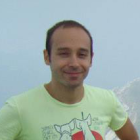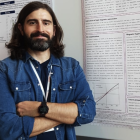People

Bio

BIO

BIO
Carlotta received her Master Degree in Chemistry at the University of Rome "La Sapienza" (Italy) in 2011.
In December 2014, she obtained her Ph.D. in Chemical Science (label “Doctor Europaeus") at the University of Rome "La Sapienza", under the supervision of Prof. Camillo La Mesa, in collaboration with the Institut de Quimica Avançada de Catalunya (Barcelona, Spain) and the Dept. of Biology and Biotechnology “Charles Darwin” of the University “La Sapienza”, where she performed part of her work as a PhD visiting student. Her PhD project focused on the formulation and characterization of synthetic vesicles and the study of their interaction with biomacromolecules, especially nucleic acids, for non-viral gene delivery applications.

BIO
Matteo Battaglini received his bachelor degree in Biotechnology, with 110/110 summa cum laude and than the Master Degree in Industrial and Molecular Biotechnology; grade 110/110 summa cum laude. In May 2020 he received his doctorate in Biorobotics (Scuola Superiore Sant'Anna, SSSA), summa cum laude, at the Italian Institute of Technology (IIT), Center for Micro-BioRobotics @SSSA with the project: “Smart nanomaterials for the treatment of central nervous system diseases”.

BIO
Dr. Omar Tricinci (Ph.D. in Innovative Technologies, with honors, from the Scuola Superiore Sant’Anna) was born in Teramo, Italy, on January 30th, 1985. Currently he is a Post-Doc in the Smart Bio-Interfaces group of the Italian Institute of Technology (IIT). He has gained valuable experience in clean room facilities, like 3D direct laser lithography, lithographic techniques, micro-fabrication process development and specification; he is also trained in profilometry, optical microscopy and scanning electron microscopy. His main research interests regard biomimetics, in particular applied at the micro- and nano-scale, for the realization of micro-robots, micro-patterned functional surfaces and bio-hybrid systems.

BIO
Andrea Desii is a Researcher in the Smart Bio-Interfaces Research Line, who has worked on the study and development of new nanotechnology-based biomedical solutions for the last 12 years. A material scientist by formation, his research interests have ranged from the colloidal properties of oligopeptides to the electrochemistry of bio-interfaces. In the framework of SLaMM he develops new magnetic nanomaterials with improved hyperthemic properties and “smart” surface functionalizations.

BIO
Nerea Iturrioz Rodríguez obtained her bachelor in Biology in 2013 at the University of the Basque Country. She has 2 masters' degrees, one in Neuroscience studied at the University of the Basque Country and the second one in Molecular Biology and Biomedicine carried out at the University of Cantabria. She obtained her PhD in the Molecular Biology and Biomedicine program of the University of Cantabria (2019). Since July 2020 she has joined the Smart Bio-Interfaces team to work within the project “Smart nanomaterials for the treatment of central nervous system diseases

BIO
Daniele De Pasquale received a master degree in Industrial and Molecular Biotechnology (2016) at the University of Pisa (Italy) He is currently a third-year Ph.D. candidate in Biorobotics at the SSSA and is working at the SB-I laboratory of the IIT. His research activities deal with the study of smart-nanomaterials for human healthcare and the development of innovative in vitro models to mimic physiological environment and 3D cancer model. Daniele within SLaMM research line works out on nanovectors with high tumor-targeting selectivit

BIO
Andrea Degl’Innocenti studied at the University of Pisa; there he obtained his BSc and MSc (with honors) in molecular biology. He then pursued his doctoral studies in Germany, working on the genetics of smell at the Max Planck Institute for Brain Research. After completing his PhD, he spent some more time at the institute as a postdoc, and then returned to Italy to join IIT. Currently, he mainly studies space-elicited oxidative imbalance, with a multi-omic approach. Other interests include vision/olfaction genomics and neuroscience. Concerning the SLaMM project, Andrea utilizes transcriptomics and proteomics to characterize the response of glioblastoma models to nanotechnological treatments.

BIO
Lilianne Beola Guibert obtained her bachelor's and Master´s degree in Biochemistry at the University of Havana (Cuba). She received her Ph.D. in 2020 at the University of Zaragoza (Spain) in the Analytical Science in Chemistry program. Currently, she is a Post-Doc in the Smart Bio-Interfaces group of the Italian Institute of Technology (IIT) within the framework SLaMM project. Her main research interest has been focused on the study of magnetic hyperthermia as an antitumoral strategy on different in vitro and in vivo models

BIO
Asimenia Lekidou earned her bachelor’s and master’s degrees in chemical engineering from Aristotle University of Thessaloniki (AUTH). She completed a seven-month internship at Friedrich Alexander University (FAU) in Erlangen, Germany, working with biomaterials and hydrogels. Currently, she is a Ph.D. student at the Polytechnic University of Milan (POLIMI), collaborating with the Italian Institute of Technology (IIT). She is part of two groups at IIT: Smart Bio-Interfaces and Printed and Molecular Electronics. Her main research focuses on stroke and neurodegenerative diseases, specifically developing advanced in vitro platforms for neuroprotection, neuromodulation, and neurostimulation.